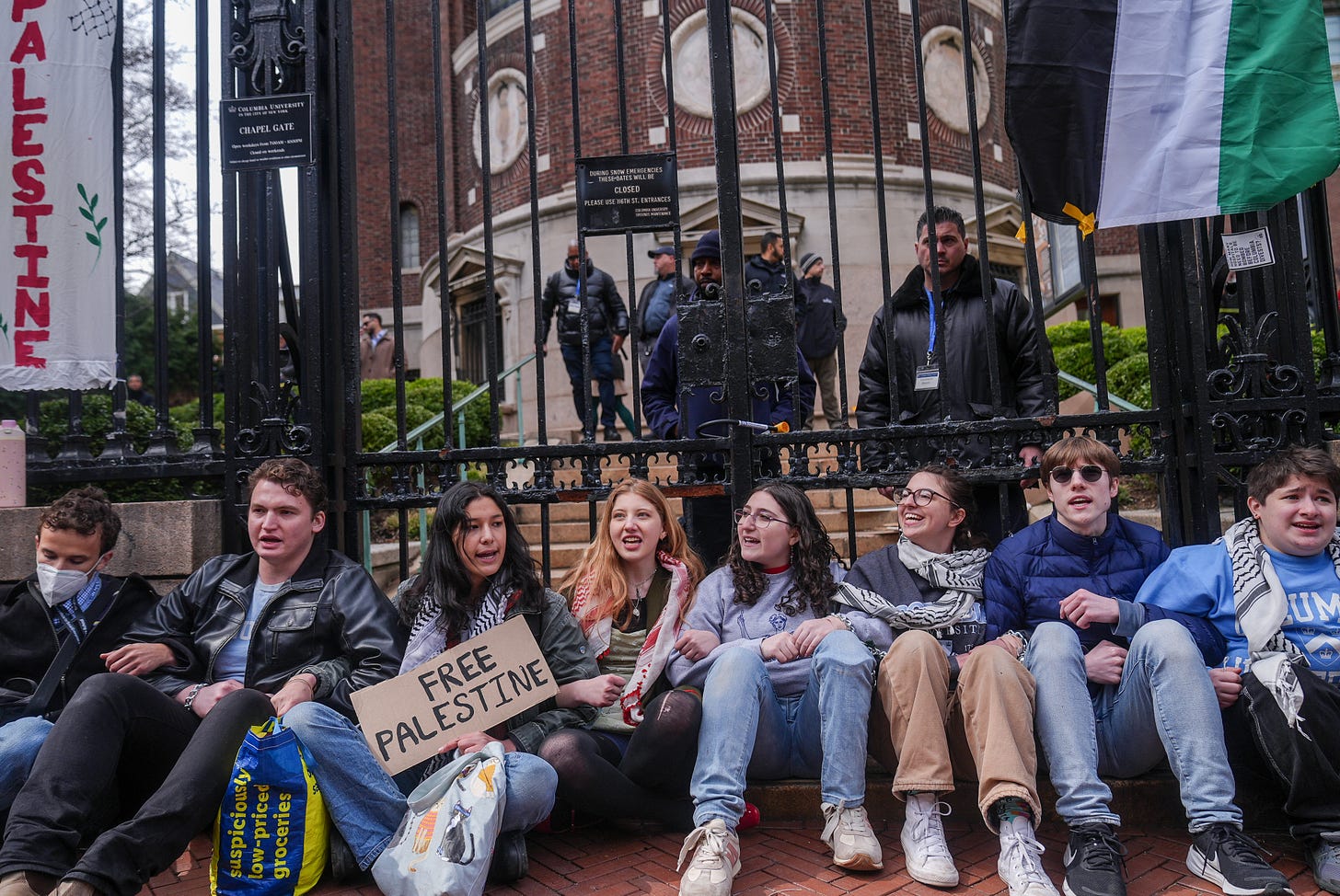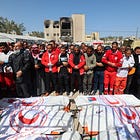Keffiyeh-Wearing Columbia Students Were Allegedly Assaulted. A Year Later, No One Has Been Punished
It’s clear Washington and universities do care about campus safety – just only for one group: pro-Israel students.

At a Columbia University gala, students wearing keffiyehs were allegedly called terrorists, told to “go back to Gaza,” and grabbed, pushed, and had their keffiyehs snatched by other students. At one point, students reportedly sang the Israeli national anthem, some flipping off those wearing keffiyehs, “obstructing the main walkway out of the event.” After the gala, five men allegedly verbally confronted two students, including one who had said they were a Jewish student with different views on Israel, and proceeded to kick and punch them.
Nearly a year later, and it appears no one has been held accountable for the alleged assault.
The incident didn’t get much media coverage, and no congressional hearings – but perhaps that shouldn’t be a surprise, given it’s one of now a mountain of examples illustrating whose “safety” universities and Congress really only care about: pro-Israel students.
Chronicle of violence
The alleged gala attack is cited in a massive 335-page report released earlier this week by Columbia University’s senate – composed of both students and faculty. The document meticulously chronicles the school administration's response to the pro-Palestine and anti-war student protests over 15 months.
Along with the alleged attack, that timeline includes the school blaming students for hosting a rally for Gaza, where they could then be attacked with a noxious spray by pro-Israel students (and paying out $395,000 to one of the perpetrators), hiring private investigators to enter student residences, siccing the police onto its own students – twice, and creating unaccountable university committees tasked with overseeing student discipline and rule enforcement.
The timeline also looked at the parade of several members of Congress (both on campus and in DC) calling for a crackdown on student protesters, and two group chats: one of billionaires and one of pro-Israel alumni and current faculty, including a dean – where participants discussed efforts to push the school to crack down harder on students.
So, in many respects, the report is a chronicle of the violence tolerated, encouraged, and enacted under the flag of “student safety.”
And the university’s response to the gala attack underscores just who is – and who isn't – worth keeping safe on campus.
The students who were affected by the alleged gala attack, and their parents repeatedly reached out to the university, according to the Columbia Senate report, to little avail.
“[Y]ou removed and interim suspended (pending Columbia’s investigation) over 100 students for occupying a lawn for 30 hours,” parents wrote in one email. “It has now been almost 72 hours since you were presented with detailed descriptions, witnesses, videos, and the names of Columbia students who physically assaulted, harassed, and tried to remove the clothing of other Columbia students at the GSSC Gala… Surely you agree that these actions are far more serious than chanting slogans on a lawn.”
Evidently, the administration disagreed. They got no substantive response to their appeals to the school.
One of the students targeted, granted anonymity to speak freely, told Zeteo that the university seems to offer “preferential treatment with which students are entitled to protection,” which makes them feel like a “lesser student” in the eyes of the administration.
The source explained that they and other victims had not come to the gala together or coordinated to wear keffiyehs.
The student told Zeteo a repeat incident happened weeks later, at another school gala, where students allegedly poured alcohol on the heads of a group of pro-Palestine students, many of whom were Muslim. “That's the kind of thing that we enable when we let these things pass without any consequences,” they said, noting they recognized some of the alleged attacking students at graduation “getting awards and getting recognized for good character.”
Many of the attackers, the group alleged, were former Israeli military officers.
Columbia did not respond to specific questions about the Senate report or the alleged attack, but said it “stands firmly behind the decisive actions it has taken to combat discrimination, harassment, and antisemitism and to protect the safety and well-being of our community.”
An Excuse for a Crackdown
The Columbia senate report only examines incidents up until the end of last year, meaning recent events, including ICE's presence on campus and the Trump administration's detention of student protest leader Mahmoud Khalil at his university housing are not included.
The authors noted that senior administrators, with the exception of former President Minouche Shafik, refused to be interviewed “to clarify and explain their often unusual and sometimes extraordinary actions: broad suspension of students without proper due process; calling the NYPD onto campus twice to arrest students; and the surveillance of students and faculty.”
But why would they clarify? What is there to explain? These contradictions: violence and escalation at the behest of “student safety” – and ultimately, to defend violence in Palestine – are perhaps not contradictory at all to those enacting it. Top officials at elite institutions like Columbia may not be ‘complying with’ or ‘obeying’ external influences like the Trump administration as much as they are welcoming the excuse to ‘reluctantly’ go along with an escalating crackdown on academic freedom.
In other words, top university officials, namely trustees, are far from blameless, or even bystanders.
Last year (less than two weeks after the alleged attack against Columbia students wearing keffiyehs), centrist political group No Labels hosted a call headlined by Reps. Josh Gottheimer (D-N.J.) and Mike Lawler (R-N.Y.), who spoke with close to 300 attendees, including trustees from several schools, about how Congress could crack down further on student protesters – and even how the FBI could get more involved.
There are also the aforementioned group chats: the billionaire chat, which discussed ways to press Columbia’s trustees to take action; the alumni chat, in which participants referenced correspondence with the likes of the president, trustees, and donors.
And there’s also the simple evidence: trustees nationwide refusing, again and again and again, to even entertain student votes to disclose investments, or divest from companies tied to Israel, or recognize Israel’s genocide of Palestine. And when students protest the stubbornness, trustees respond with violence to defend the violence they’re invested in.
“Good faith”
The inanity continues. Look no further than this week, when Columbia students – led by Jewish students – chained themselves to a campus gate (one already long-locked amid the school’s relentless shutting down of its previously open campus). The students were demanding accountability for the arrest of their former classmate, Mahmoud Khalil.

Amid the action, students had one of their classmates reach out to the administration via email, according to communications seen by Zeteo, to relay requests in “good faith” in hopes “to avoid any further escalation.”
The demands included: releasing a statement “acknowledging the unlawful and shameful abduction of Mahmoud Khalil by plainclothes police officers” on campus (in the same spirit that Tufts released a statement expressing support for Rumeysa Ozturk); investigating which trustee(s) gave Khalil’s name to the government, and publishing the findings publicly; and committing to being a sanctuary campus not just in name, but to demilitarize the campus and bar federal enforcement agencies from it.
“The protesters have requested that I act as a negotiator in order to avoid retaliation towards Palestinian and Jewish students,” the student wrote in their email.
Just over an hour later, the Jewish and other pro-Palestine students got a response. Columbia public safety officers brought out bolt cutters to separate students from the gate. They first targeted Palestinian student Maryam Alwan, who had only just joined the protest. Then they dragged away the others – including the Jewish students – one by one.
The preponderance of the evidence leaves little doubt: Washington and universities nationwide do care about student safety. But only for one group: those who are pro-Israel.
Consider all the Jewish students who have been targeted and brutalized by this campus crackdown. Has there been any concern for them? Consider Republican House Speaker Mike Johnson, who, when asked about anti-Zionist Jewish students in the Columbia encampment during his parachuting visit to the campus last year, simply said, “I don’t know who’s in that camp.”
This was during a visit when Johnson and co. were supposedly addressing the encampment and meeting with victimized Jewish students!
Don’t take my word for it. Here’s an individual who knew Mahmoud Khalil, writing a letter of support for him to the court:
“Mahmoud has protected Jewish students at Columbia like myself more than the university ever has. He has even protected us from the university itself. To punish him under the pretense that this kind, brave, gentle person somehow endangered us is the most egregious lie I’ve ever heard.”
Sign up here to make sure you get my column, ‘Subtext with Prem,’ in your inbox. Please share your thoughts in the comments, and feel free to send tips via email or Signal (premthakker.35).
Editor’s note: This story has been updated with a comment from Columbia University.
Check out more from Zeteo:






Mainstream coverage of the protests in support of Gaza has been so poor. Rarely is it mentioned that many of the protestors are Jewish. Where are the interviews with Jewish Voices for Peace, If Not Now, Rabbis4Ceasefire or Breaking the Silence? Kudos to all of the independent journalists with progressive sites who publish stories such as this one about harassment at Columbia. Thank you, Prem.
Thanks for pointing out yet again the clear bias and outright prejudice against anyone opposing Israeli violence and the Zionist state. Mainstream media coverage is not only missing in most cases but is in many cases repeating the lies about both the protests and the protestors. When universities that are the bastions of freedom, speech, and education for all become tools in the hands of a few fascist minded groups it is the beginning of the end of USA now that its veneer of democracy has been exposed for all to see.